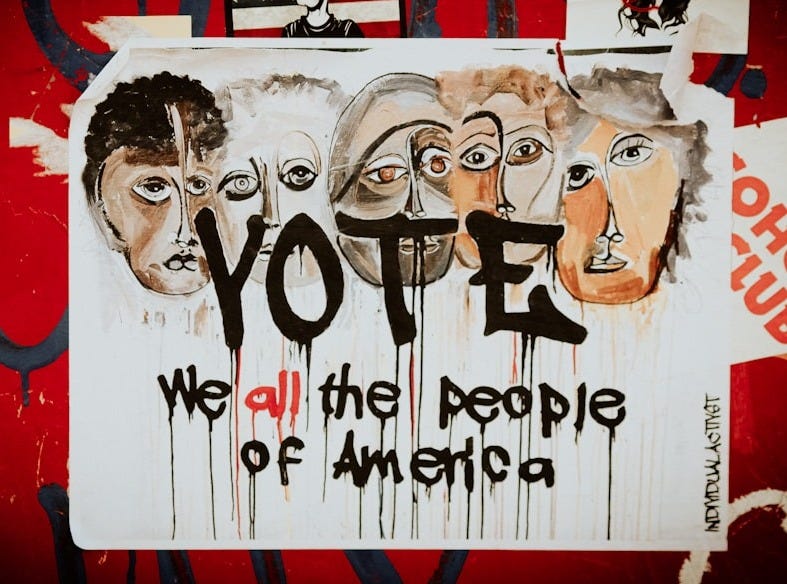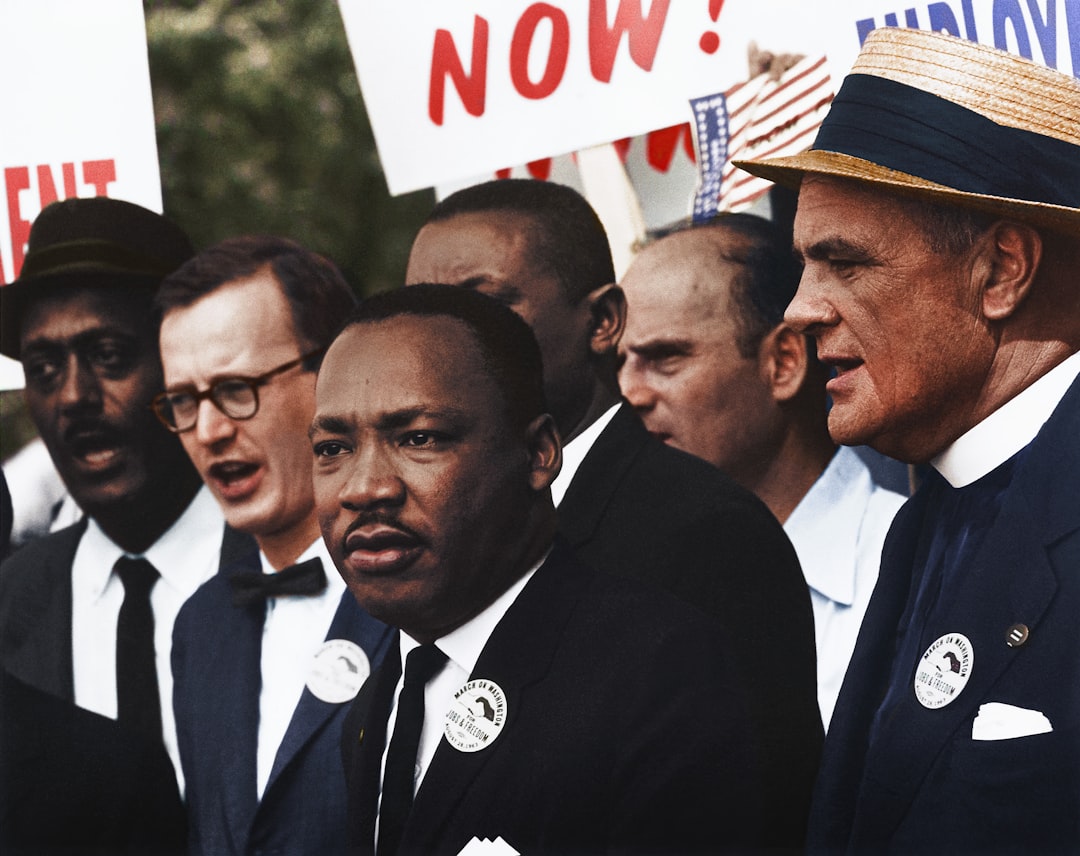How to Build a Consensus on Election Results
Freedom, the will of the people and the right to be heard.
Our country needs to move forward. I would prefer a total blow-out on election night, but should it carry on, we need a way to talk about the election process that will allow both sides to agree on how to judge fairness and legitimacy. We need people to see that we’re all fighting for the freedom we gain from self-government, for elections that faithfully represent the will of the people, and to protect American citizens’ right to be heard.
The Threat to Democracy
The idea that democracy is under threat is pervasive on both sides of the aisle, but for different reasons. Conservatives have convinced people that we want to loosen voting restrictions to allow many ineligible people to vote. We want people to understand that adding more barriers to voting deprives many eligible people of their ability to vote.
In the public debate, you can’t win just by saying, “They’re lying and we’re not,” no matter how many facts you have on your side. The only way to persuade people is to appeal to them based on common American values and give them an unassailable set of moral criteria that they can use to judge for themselves.
We need to make it clear to people that we are motivated by our shared belief in freedom and self-government, and our desire to have elections that faithfully represent the will of the people - all of the people.
How to Establish Moral Criteria
I wrote previously about how we can respond to falsehoods and attacks, not by trying to refute them, but by diverting to a strong value statement.
When we say something that is morally indisputable, we either cause the listener to engage in conversation from our moral perspective, or we plant a seed in their mind that could grow even if they slam the door in our faces. Either way, we’ve achieved our goal.
The same is true for political debates. Your mission is not to prove your opponent wrong, but to activate your strong value statement in the mind of the listening audience.
In this case, we need to use and repeat these statements wherever possible, in order to establish a common standard in the minds of the American public, by which we all judge the legitimacy of the results of the upcoming elections.
Thank you for reading Reframing America! My work is completely financed by subscribers like you. Sign up here to receive new posts by email. All content is free, but many people choose to become paying subscribers to support this critical mission of improving how we communicate with the American people.
Self-Governance
We can’t just assume that people know why the right to vote is so important. We have to talk about it out loud. We want people to feel deep in their bones that depriving someone of their ability to vote or have their vote counted is seriously, even criminally, morally wrong. That’s why we have to talk openly about the relationship between voting and freedom.
What does voting have to do with freedom?
The right to govern ourselves is our first and most fundamental freedom, tied, perhaps, with our right to control our own bodies. Without those rights we are not free: not just “not free to act as we please,” but “not free” in our entire state of being.
We choose to have laws because we want to live in a society that is safe, functional and fair, but we are not trading in our freedom for the benefits of civil society. We remain free, because we get to choose the people who make those laws.
Take away one person’s vote, and you take away their freedom: the right to have their say in choosing the representatives whose decisions impact their lives. Take away enough people’s votes and you deprive the entire community of its freedom.
Value Statements:
It’s not just about being free to vote. Voting is what makes us free.”
“What makes America a free country is the right of our citizens to live under a government of their own choosing.”
“If you take away a person’s vote, you take away their freedom: their right to have their say in choosing the people whose decisions impact their lives.”
The Will of the People
What makes an election legitimate?
Democracy means self-government. The freedom of a community depends on its right to choose the government under which it has to live. Elections are how a community makes and expresses those decisions.
Value Statements:
(We can all agree that…) “The purpose of an election is to faithfully express the will of the people.”
“The only way to determine the true will of the people, is to make sure that every eligible person has equal access to voting and to having their vote counted.”
Moral Criteria:
“Will [disputed action] make this election more faithfully or less faithfully represent the will of the people?”
In order for election results to be legitimate, to faithfully represent the will of the people, all three of these things need to happen:
People who are not eligible should not vote.
All people who are eligible to vote must be able to cast their votes.
All votes of eligible voters must be counted.
Voter Fraud
Republicans want to keep the debate focused exclusively on the first criteria, because everyone knows that “fraud” is inherently bad. We know that actual voter fraud is virtually non-existent, but we shouldn’t just dismiss people’s concerns. After all, if there were more fraud than suppression, it would be a legitimate problem. We should agree that it does matter and reassure people that there are plenty of safeguards in place to make sure it does not happen.
Many voters do not know that there are negative unintended consequences (or perhaps ill-intended consequences) to adding barriers to voting. Every law we pass or procedure we create to prevent ineligible people from voting prevents many more eligible American citizens from voting.
Rather than just telling people this, we get people to ask the question that will lead them to the right answer:
Moral Criteria:
“Will [action being debated] be likely to suppress more eligible votes than it prevents ineligible votes?”
It’s the disproportionate impact that prevents the election from faithfully representing the will of the people. Fraud is so rare as to be unlikely to change the outcome of the election. Voter suppression impacts many more people, posing a much more significant threat to the legitimacy of the election results.
The Right to be Heard
How do we determine whose votes should be counted?
Republicans will question whether every rule or minor instruction was flawlessly obeyed. There will be endless court cases over what should or shouldn’t be counted. We have to make the debate about freedom, rather than the letter of the law.
Strong Value Statements:
“The freedom of every American citizen depends on their right to be heard, and that means getting to vote and having your vote counted.”
“We do not deprive American citizens of their freedom over minor technicalities or paperwork errors.”
Moral Criteria:
“Wherever a vote is challenged, we must rule in favor of the voters’ right to be heard.”
“Does this person have the right to be heard in this election? If a person is eligible to vote, we must let them vote and count their vote.”
We do not deprive American citizens of their freedom just because their drivers’ license unexpectedly expired or they didn’t write in their zip code. If it is possible to determine that they are eligible to vote in that election, even if you must take extraordinary measures to do so, you must let them vote and count their ballot.
The “Intent of the Voter” Standard
Some disputes are about how a person filled out a ballot. We want election judges to rule generously based on the voters’ right to be heard, as opposed to strict adherence to the letter of the law.
Moral Criteria:
“If you can determine the intent of the voter, you must count their vote.”
The purpose of a ballot is to determine the intent of the voter. If you can see who a person intended to vote for, even if - for example - they wrote a check mark instead of filling out an oval, you must count their vote.
The Bottom Line
How can we get everybody to use a common set of criteria to judge the validity of the election and its results, so that we can bring our country back together and move forward?
How do we get the American people to understand that being able to vote and have your vote counted is essential to our freedom? How do we get them to understand that it is morally wrong to deprive a person or a community of their right to be heard, to express their will in choosing the representatives that will make the decisions that impact their lives?
Here’s how: We spend less time arguing about why our opponents are wrong and more time communicating to the American people what we believe to be right and wrong. We get out there and make and repeat our strong value statements, thus providing people with the moral criteria they can use to judge for themselves.
Thanks, as always, for reading. I hope we all can keep our spirits up and keep working through these next few stressful weeks, and that all of our love and labor pays off!
In solidarity,
Antonia
Contact me with any questions about language use and attribution or consulting at: antonia@antoniascatton.com or (202) 922-6647.
NOTES:
There are many more talking points and advice on what words to use or not use in the newsletters below!










This is a great post and one that I will keep as a reference to share with others. Thank you!
Very well written. You’ve organized the steps in easy-to-understand words that do not “trigger.” My hat’s off to you…& I’m sending to all my fam and friends. Thank you. Sara